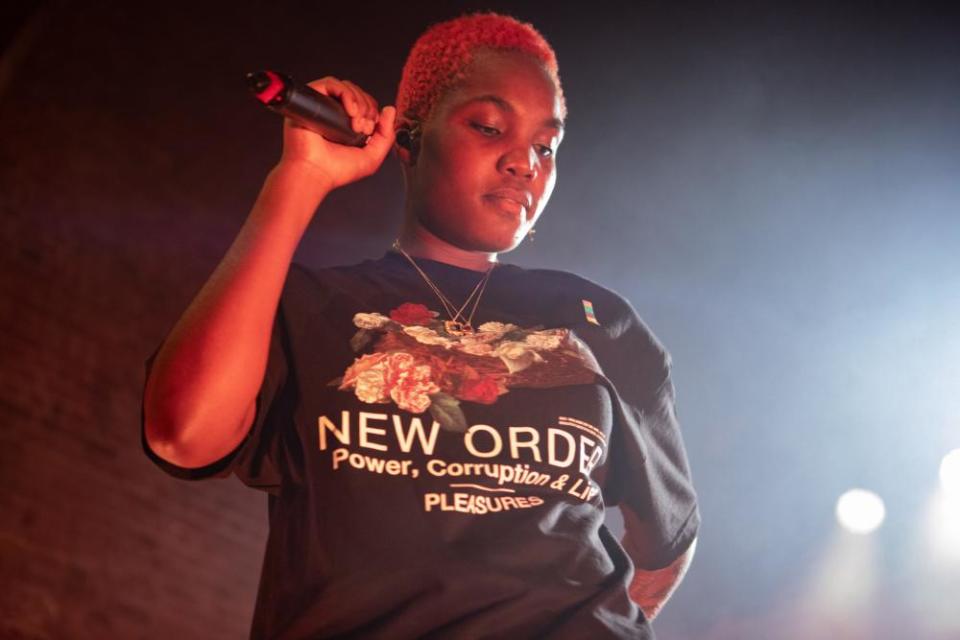Arlo Parks review – heart-rending and frustrating

Outside, night has fallen; inside, it’s still a summer’s day. This intimate venue is festooned with strings of plastic flowers hanging from the ceiling and wrapped around the mixing desk.
Blooms are very much in order because last week, the 21-year-old poet and singer Arlo Parks won the Mercury prize for her debut album, the widely feted Collapsed in Sunbeams, beating off arguably the strongest field of competitors in years: Sault, Celeste and Black Country, New Road, to name but three. Notably, seven out of 12 of the shortlisted artists this year were black – eight, if you count jazz legend Pharoah Sanders’s heady incursions on the collaborative album made by Floating Points with the London Symphony Orchestra. At a guess, Parks’s feeling of validation this week must be second only to that of fellow young British overachiever Emma Raducanu.
Parks only mentions the “big prize” she won at the very end of her set, but its valedictory glow accompanies her tender, candid songs throughout. Collapsed in Sunbeams won because it captured the best of British youth in the raw – people barely at the start of their lives reeling from poor mental health and unrequited love. These vignettes were delivered with an eye for deep hues – “all amethyst”, “the deep blue cramp of everything” – and a writerly ear for the universals contained in Parks’s own granular experience.
There is a weird disconnect between the intensity of Parks’s lyricism and the pre-set-fest beneath
We all know a “Charlie”, the subject of Parks’s first song, Hurt, who numbs his pain alone in various ways. Even if we’ve never put the moves on a friend, many will resonate with the soft bruise that is Green Eyes, in which Parks, the spurned lover, is full of compassion for her inamorata, unable to fully commit. All this sage, sweet witness-bearing was there in embryo onher 2019 EP. “Shut your mouth and take your vitamins, bite your nails and sell your Ritalin,” she coos sadly on Sophie, “I hate that we’re all sick.” Although Parks has been dubbed the voice of her generation, “sick” here is really not a slang term.
The trouble is, the Mercury prize is given for music, and many of these tracks don’t sound like prize-winning tunes. It remains true that one listener’s babbling brook is another’s water torture. But it’s a pity that Parks’s lines of quiet devastation come paired with bland beats that make you feel that you are on hold for an hour.
Everything on this heart-rending, frustrating album – and its live iteration – clocks in at a mid-paced shrug. All of Parks’s acutely observed tales of teenage suffering and succour are borne along on a too-tasteful music of soulful influences.
Like a lot of recent music, it leans heavily on the 90s. But if Parks – an artist so dextrous she can whip the microphone around her hand like a coin trick – and her chief producer, New Yorker Gianluca Buccellati, were inspired by the music of that decade, they ran with its drearier end. Rather than echoing the best trip-hop – the work of Massive Attack or Portishead – these productions echo the flaccid facsimiles of the genre, the stuff they played in DJ bars to distracted folk trying out the recently arrived Red Bull with vodka for the first time. There is a weird disconnect, too, between the intensity of Parks’s lyricism and the pre-set-fest beneath.
On Eugene tonight, Parks’s protagonist is in a fraught love triangle. This music has at least a welcome hint of the xx about it; an undertow of unease. “I hate that son of a bitch,” she avers. But her depth of feeling passes unnoticed, musically. It’s not that anguished lyricism needs to be paired with emo fireworks (or, worse, piano balladry); it’s that there are ways of foregrounding drama even in music as easy-going as Parks’s. The band just getting a little louder doesn’t cut it.
Related: Arlo Parks on her superpowered empathy: 'It's hard, but it's opened my heart'
The good news is that Collapsed in Sunbeams sounds much better live than on record, because Parks has a nine-strong outfit – two backing vocalists, drums, funky bass, two guitars, a keyboard player and some horns – to inject vim into the samey shuffle. The bad news is that the sax and trumpet, which could have brought bittersweetness, wisdom, dread and triumph to these songs, are criminally underused: just a parp here or a swell there. Caroline could go out in a blaze of glory; it’s just a pleasant singalong instead. It is a mystery why an artist who could aim for the assured punch of a 90s icon such as Lauryn Hill should end up plumping, musically, for Dido-hood instead. Parks’s radical, 21st-century empathy deserves glittering plinths, not these damp sandcastles.

 Yahoo News
Yahoo News 